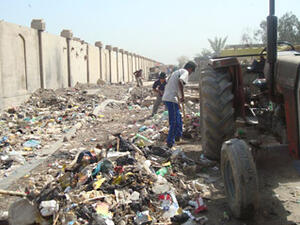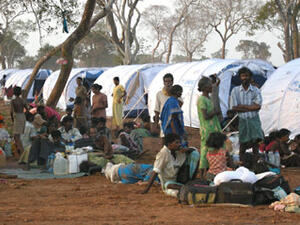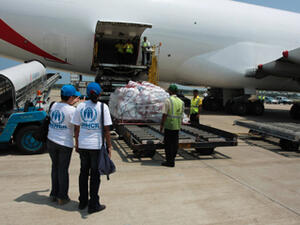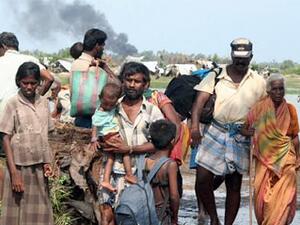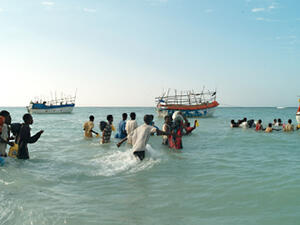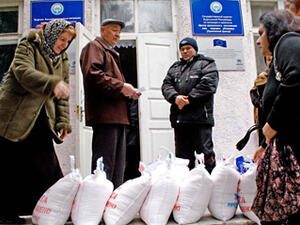Tens of thousands displaced by fighting near Monrovia
Tens of thousands displaced by fighting near Monrovia

Liberian refugees in Tabou, where the overcrowded transit centre is being expanded to accommodate more recent arrivals.
MONROVIA, Liberia, June 6 (UNHCR) - The continuing conflict in Liberia has displaced tens of thousands of refugees and locals near the capital Monrovia, and sent more than 23,000 Liberians fleeing into western Côte d'Ivoire in the last two weeks.
On Thursday, UN refugee agency staff in Liberia reported that resurgent fighting between the government and rebels of LURD (Liberians United for Reconciliation and Democracy) near Monrovia had spread to VOA and Banjor camps, which hosted Sierra Leonean refugees. The sprawling neighbouring camps for internally displaced Liberians were also affected. The camps were deserted, and tens of thousands of refugees and displaced people were seen seeking refuge in various locations in Monrovia. Some of UNHCR's local staff were also displaced from their homes.
And as the conflict rages in eastern Liberia, UNHCR has learnt that a group of 1,000 Ivorian refugees who had earlier fled their country's civil war for Harper in south-eastern Liberia are now asking for help to return home. The Ivorian army is exploring ways to escort them along the 18-km stretch of road to the border crossing at Prollo, and then across the river in dug-out boats. About 1,000 Malian and Burkina Faso nationals are also believed to be stuck in Harper.
Harper and Plebo, both in south-eastern Liberia's Mariland county, were captured by rebels of MODEL (Movement for Democracy in Liberia) in May. In the last two weeks, the fighting has driven more than 23,000 Liberians into western Côte d'Ivoire. Many others have arrived, undocumented, through informal entry points after crossing the Cavaly river or via the Atlantic Coast. The pace of arrivals has slowed since the weekend.
To cope with the recent influx, the UN refugee agency has been working to expand a transit centre in Tabou, south-western Côte d'Ivoire. The centre was originally built to accommodate 700 people, but now hosts more than 2,500. After the expansion, its capacity will increase to 3,000 people.
However, construction work has been hampered by poor weather conditions. UNHCR is trying to identify community buildings that could be used to shelter some of the new arrivals before the transit centre can be completed.
UNHCR also remains very concerned about the general health situation, especially of children. Together with Médecins Sans Frontières (MSF), which has mobile teams visiting villages near the Ivorian-Liberian border, the refugee agency fears the spread of diarrhoeal diseases after the death of two children.
On a more positive note, UNHCR staff have reported an improvement in the attitude of the host communities, whose initial hostility towards the Liberian refugees have slowly given way to acceptance. The refugee agency has distributed plastic sheeting in the host villages near the border in a bid to ease local tensions.




